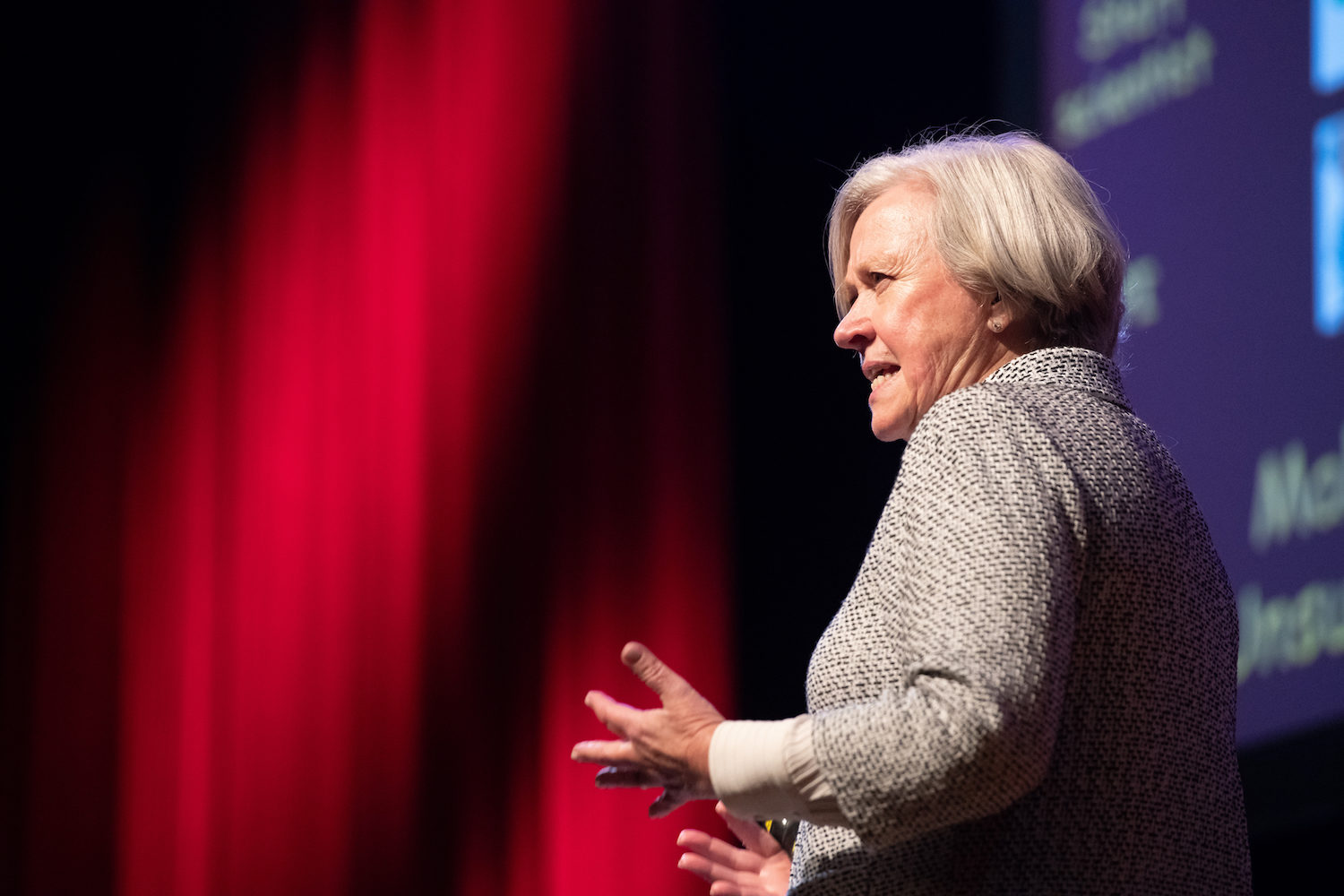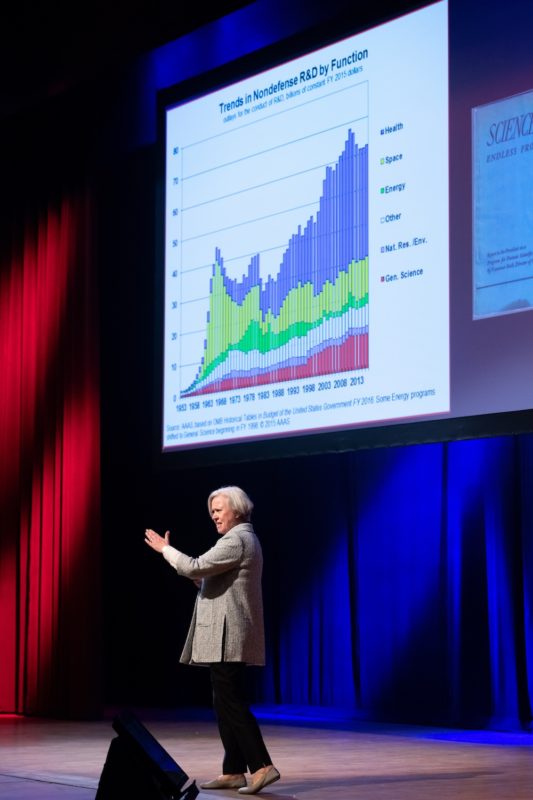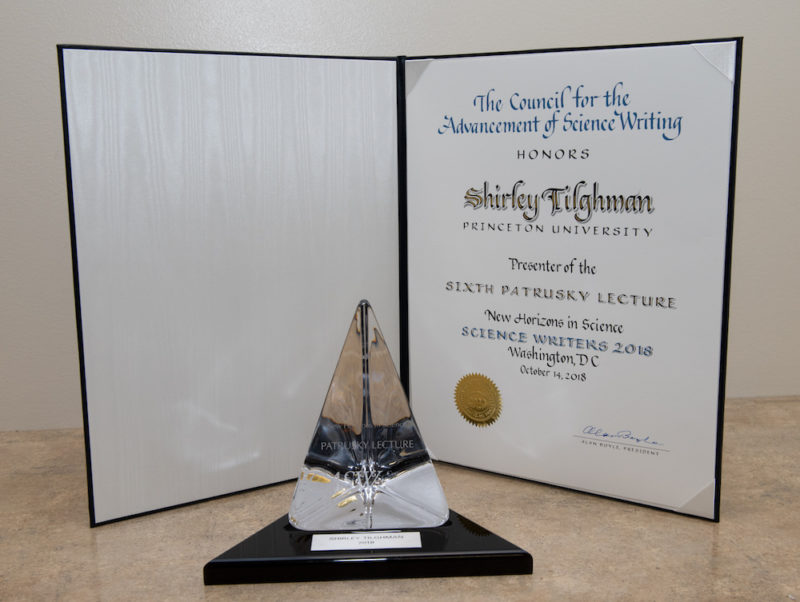
Shirley Tilghman presents the sixth Patrusky Lecture
Shirley Tilghman speaking at ScienceWriters2018 (Photo by Dave Scavone.)
Shirley M. Tilghman, a mammalian developmental geneticist who served as the 19th president of Princeton University, presented the sixth Patrusky Lecture on Sunday, October 14, 2018, during CASW’s New Horizons in Science program at ScienceWriters2018 at George Washington University in Washington, D.C.
Tilghman chose “Righting the Ship: Systemic Flaws in the Biomedical Research Enterprise” as the theme of her address to science writers. Her talk celebrated the promise of remarkable new methods in biomedical science while pointing to structural problems that may prevent society from reaping their benefits. She gave her view of the roots of this dilemma and offered some solutions. A video recording of her talk is available on the Patrusky Lectures video page.
Along with leading scientists Bruce Alberts, Judith Kimble and Harold Varmus, Tilghman is currently engaged in a project called “Rescuing Biomedical Research,” which advocates reforming the U.S. research system in order to encourage creative and innovative research and boost basic science.
 In a 2014 essay and 2015 opinion piece in the Proceedings of the National Academy of Sciences of the U.S., Alberts, Tilghman, Varmus and Marc Kirschner of Harvard University decried logistical, administrative and conceptual logjams resulting from the hypercompetitive environment of U.S. biomedical science, the burden of grant writing and administration, the distorting effects of the publishing and government funding systems, and the nearly two decades of training now required to become an independent investigator.
In a 2014 essay and 2015 opinion piece in the Proceedings of the National Academy of Sciences of the U.S., Alberts, Tilghman, Varmus and Marc Kirschner of Harvard University decried logistical, administrative and conceptual logjams resulting from the hypercompetitive environment of U.S. biomedical science, the burden of grant writing and administration, the distorting effects of the publishing and government funding systems, and the nearly two decades of training now required to become an independent investigator.
About Shirley M. Tilghman
It was not Tilghman’s first appearance on CASW’s New Horizons in Science stage. During her earlier research career, she studied the way in which genes are organized in the genome and regulated during early development and was a member of the team that cloned the first mammalian gene. She was one of the founding members of the National Advisory Council for Human Genome Research.
A member of the Princeton faculty since 1986, she was named president of the university in 2001. She returned to teaching in 2013.
As the sixth Patrusky Lecturer, Tilghman was presented a certificate and crystal sculpture, one of many honors bestowed upon her. She is an Officer of the Order of Canada and the recipient of a Lifetime Achievement Award from the Society for Developmental Biology, the Genetics Society of America Medal, and the L’Oreal-UNESCO Award for Women in Science. She is a member of the American Philosophical Society, the National Academy of Sciences, the National Academy of Medicine and The Royal Society of London. She serves as a trustee of Amherst College, the Institute for Advanced Study, the Simons Foundation, and the King Abdullah University of Science and Technology. She also serves on the Science Advisory Board of the Chan Zuckerberg Initiative, is a director of The Broad Institute and is a Fellow of the Corporation of Harvard College.
About the Patrusky Lectures and Ben Patrusky
 Tilghman joins a list of distinguished scientists invited to give an authoritative and expansive address at the annual ScienceWriters meeting, which combines the workshop program of the National Association of Science Writers with CASW’s New Horizons in Science briefings. Previous lectures, all available on video here, were given by George M. Whitesides of Harvard University (2013), Donald Johanson of Arizona State University and the Institute of Human Origins (2014), Jo Handelsman of Yale University and the White House Office of Science and Technology Policy (2015), Steven Weinberg of the University of Texas at Austin (2016), and Susan Desmond-Hellmann of the Bill & Melinda Gates Foundation (2017).
Tilghman joins a list of distinguished scientists invited to give an authoritative and expansive address at the annual ScienceWriters meeting, which combines the workshop program of the National Association of Science Writers with CASW’s New Horizons in Science briefings. Previous lectures, all available on video here, were given by George M. Whitesides of Harvard University (2013), Donald Johanson of Arizona State University and the Institute of Human Origins (2014), Jo Handelsman of Yale University and the White House Office of Science and Technology Policy (2015), Steven Weinberg of the University of Texas at Austin (2016), and Susan Desmond-Hellmann of the Bill & Melinda Gates Foundation (2017).
Ben Patrusky embarked on his science-writing career in the early 1960s after earning a degree in electrical engineering from City College of New York and winning a science-writing fellowship at Columbia. After a dozen years as the research writer and science editor for the American Heart Association, in 1975 he embarked on a freelance science-writing career and took charge of the New Horizons in Science briefing program for CASW, becoming executive director in 1988. He has also orchestrated science journalism seminars for, among others, the National Academy of Sciences, Research to Prevent Blindness, the Kellogg Foundation, and the Ford Foundation.
Widely published and the author of two books, he is the recipient of the Science Journalism Award from the American Institute of Physics and the American Chemical Society’s Grady-Stack Award. He is an honorary member of Sigma Xi, The Scientific Research Honor Society, and for 18 years, until 2008, served as a member of the board of trustees of Science Service (now the Society for Science and the Public), publisher of Science News. Ben is a long-time member of the board of governors of one of the nation’s oldest press clubs, The Society of the Silurians.